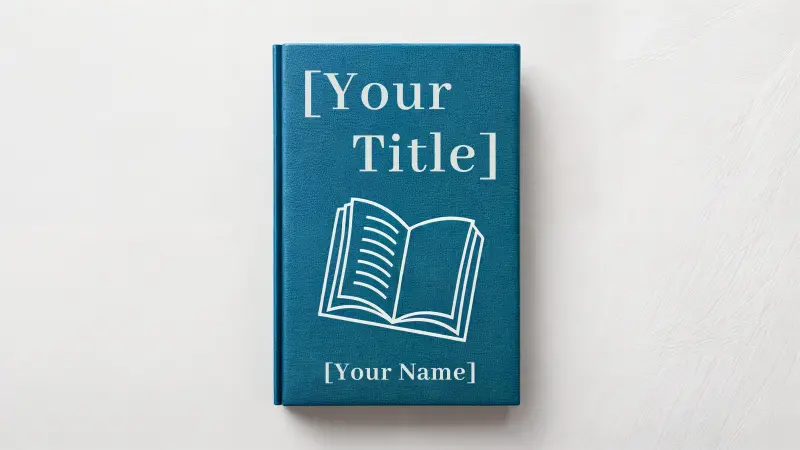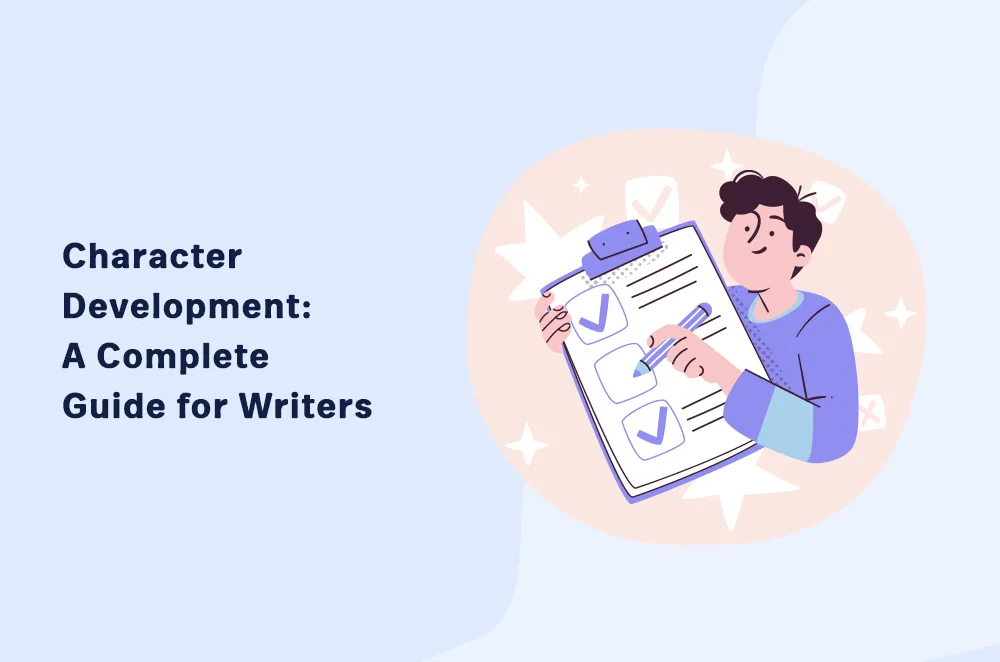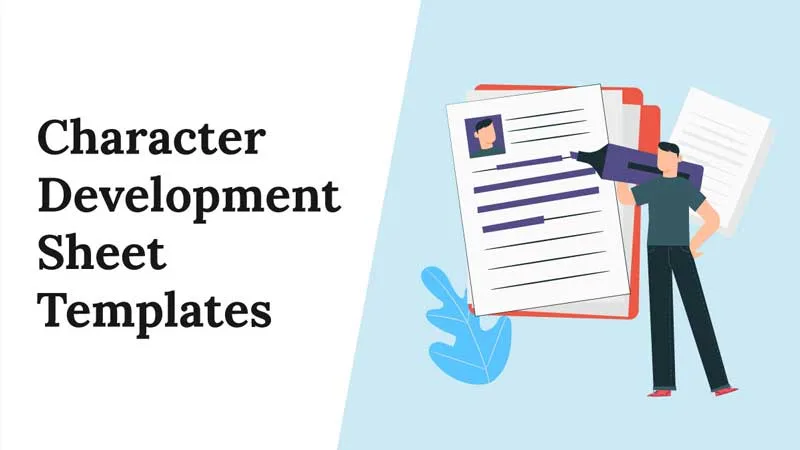If you’ve ever tried your hand at writing a novel or screenplay, you know characters are key. Crafting them well is essential. Without fully developed, believable characters, your story will not stand out. That’s why mastering character profile creation is crucial.
Using an ultimate character profile template will immensely aid you in this process, ensuring you don’t overlook any important aspects.
This article outlines the steps to create a character profile, including a character profile template, various types of character profiles, and other essential elements for developing a character profile. Let’s dive in.
Steps to Create a Character Profile
Here is a step-by-step procedure for creating a character bio:
1. Understand the Basics
Before starting, first determine which of your characters will require a character profile. Then decide on the basics.
It will be a long process, and you’ll go through a lot of information. But you do not need to do it all at once. Take one section at a time.
If you’re struggling to determine certain details or you’re not sure how your character should react, Deb Norton offers some good advice:
“When we’re at a loss for putting words in our character’s mouths, that’s often when it’s time to stop thinking and start listening. Does his manner of speech change when he talks to his kids? What is he holding back? Why did he use that word?”
As writers, we sometimes tend to overthink a little bit (or a lot). Sometimes, it’s better to write more freely. Channel your character and just let go. You will be surprised at what they reveal on their own.
This first section is pretty self-explanatory and will be one of the simpler ones. It covers the basic information about your character and their life.
This includes things like:
Name
Age
Place of birth
Current place of residence
Nationality
Education
Occupation
Marital status
If you are looking to get started right away, then generate a full-length book with AI:

2. What is Their Physical Appearance?
This one may seem self-explanatory as well, but there is a little more to it than you might think. You will be covering your basic physical characteristics:
Height
Build
Eye color
Hair color
Face shape
But the character’s physical appearance goes a little deeper than this. There are some additional things you will want to understand their distinguishing features :
Do they have any distinguishing marks? (tattoos, scars, birthmarks)
What style of clothes do they prefer to wear?
Do they wear glasses or contacts?
Do they wear accessories or not?
Is there an accessory or piece of jewelry they never take off?
What is their level of grooming? (disheveled and natural or style hair, makeup, outfit put together)
Do they have any chronic illnesses that contribute to their appearance?
You should also consider their demeanor. Are they confident, shy, quiet? What are their magical abilities Do they walk with their head down, or held high? These things are representative of what is going on inside, but they will be reflected in how they appear to others.
3. How do They Communicate?
The base of this section focuses on how they talk. Do they speak quickly or slowly? Do they enunciate or do they mumble a little bit? How big is their vocabulary?
But, speaking isn’t the only form of communication. There’s more to it:
Do they gesture compulsively, or is it occasionally?
Do they make eye contact or do they move their gaze around?
What is their catchphrase?
Do they ever curse?
Do they have a speech impediment?
How do they laugh? Do they make other people laugh?
What is their smile like?
Are their emotions easy to read or do they hide them?
What is their default expression?
4. Know Their Props
Props are something that your character carries around or uses regularly. These props will be connected to their personality. It will be important to them or something they find helpful.
For example:
Sherlock Holmes has his pipe.
Kojak has a lollipop.
A character who has anxiety might carry something to squeeze or fiddle with to occupy their mind in stressful situations.
A character who has lost a parent or other loved one might wear or carry an item that reminds them of that person daily.
These items can be indicative of a bad habit, a nervous tick, or something in which your character finds comfort.
5. Discover the Background and Past
A character’s background and past will play a huge role in their present life. It will shape who they are as a person. Even if their history is not a huge part of the story itself, it needs to be known.
It should be known in full by you as a writer. It should also be known, as necessary, by the readers. Reveal things about their past as it becomes vital to the story.
You can start with the basics:
Where did they grow up? Do they still live there?
What education do they have? What subjects did they study?
How was their childhood? Were they neglected, sheltered, or raised well?
Were they involved in any extracurriculars as a child? (sports, dance, clubs, etc.)
What are some of their happiest, saddest, and earliest memories?
What were they like as a child?
6. Discover Their Likes and Dislikes
They may not seem significant, but a character’s likes and dislikes develop their personality. Much of their personal preferences will stem from their background, childhood, family, and influences.
For example, your character might have an intense hatred of a certain food because their mother forcefully and excessively fed it to them as a child and it brings back bad memories.
Or, their favorite music could be related to what their parents played around the house when they were younger.
For each favorite thing, determine their least favorite. For each thing they love, do they hate the opposite? These things can give you an even deeper look into your own character’s personality than you might have thought.
Here are examples of likes and dislikes that you can consider:
Favorite and least favorite food
Taste in music
Favorite genre of movie
Do they follow sports or are they indifferent?
Do they like to read?
If money was no object, what car would they be driving?
7. Understand Their Psychology
This section will dive deeper into your character’s psyche. It will require you to dive into their mind and pick out the big, important, life-changing stuff.
These are good examples of things that might not be included outright in the novel. But they help shape who your character is. Knowing these things about them will help you write them realistically and authentically.
It will create consistency in your character. Readers will never question their decisions, opinions, or emotions when they all make sense based on who they are as a person.
This can include things like:
Are they an introvert or an extrovert?
What are they afraid of?
What is their idea of happiness?
Where is their favorite place in the world?
What are their strengths and flaws?
What do they want most out of life?
How do they feel about love?
How do they react to change?
Do they desire power?
Are they a leader or a follower?
What excites them?
What do they find boring?
8. Find About Their Family
Whether healthy, dysfunctional, or somewhere in between, a character’s family is instrumental in their development and can define their personality.
Even if their family aren’t all that important to or involved in the story, it’s still good to identify them in some way.
For each of their mother, father, and siblings you should establish a few things:
Name
Age (or age they died at if deceased)
Explain the relationship they have with your main character – close, distant, strained, awkward, estranged, etc
If they are grown and out of the house, how often do they see their family members?
You can also describe their extended family. Again, this branch of their family may or may not be relevant to the story’s main plot points. But, their family will have played a big part in their development, upbringing, and feelings about certain things.
If their extended family is not important to the story, be brief in your explanations. You don’t need to go into excruciating detail, but it’s still valuable information to determine.
Even the simple fact that someone has an abnormally large or small family can be of significance. Large families may have left some feeling left behind or unimportant. Small families can have some people feeling smothered and in the spotlight too often.
You’ll want to go over grandparents, uncles, aunts, and cousins. Again, determine the ages and their relationship with your main character. Names and additional details can be revealed if the character is going to be important to the story in any way.
9. Explore Their Relationships
Whether close or not, your character’s family relationships will be some of the most significant in their lives. But, these will not be the only relationships they have. Once the family has been covered, you should dive into their external relationships.
The obvious ones here will be their friendships. Which of their friends are they closest to? Describe these relationships.
Do these “best friends” know every detail of their lives, or are they somewhat guarded even around those closest to them?
Outside of their inner circle, are there other significant friendships?
In addition to friends and acquaintances, your character will have many other relationships that affect their life in some way:
Coworkers/fellow students
Teachers/bosses
Friends of friends
Family friends
Members of sports teams/clubs they are in
Online friends (if applicable)
If your novel or screenplay is set in the present time, the internet and social media will be a significant part of the world. Which social media platforms do they have a profile on? How active are they? Or, do they reject social media?
Not being on any social media in the present day will leave a person in a unique spot of digital isolation. Many who choose to do this find it peaceful and they don’t regret their decision.
10. Where do They Live?
Where your character lives is another important part of who they are. Regardless of the world your character lives in (earth, another planet, a world you made up yourself) their specific neighborhood and dwelling should be made known as well.
Do they live in a big or small house? Or another type of residence entirely? (Perhaps something you made up for the world you’ve created).
What is the neighborhood like? Are they friendly with their neighbors? Or do they live far away from any other people?
Are they happy where they live, or do they have plans/desires to move soon? How long have they lived there?
It’s also important to look at the inside of their dwelling. Do they keep things tidy, or is it always a mess? What color are their walls and are they decorated? If so, what type of art is on display?
11. What are their Jobs/Hobbies?
Next, it’s time to examine what they do for work and how they spend their free time.
Determine these key factors about their job:
What is it?
How long have they been there?
Is it what they want to do as a career or is it a temporary situation?
Have they reached their peak or is there still room for advancement?
What is their salary? Is it enough for the lifestyle they want?
Do they like what they do or would they prefer something else?
Are they good at their job?
What hours do they work?
Is their job secure or are they in danger of losing it?
Whether they enjoy what they do or not, they are required to be there for a certain amount of time each day. Unless they want to lose their income, they have no choice.
Once the workday is over, though, their time is their own. How do they fill this time? Do they have any hobbies or do they prefer to stay home and relax? Does your character have any hidden talents or anything they excel at other than their job?
12. What are their Goals and Motivations?
This section is a simple but crucial one.
Your character will have a set of general goals, ambitions, and desires in life. But, this particular story is going to be about one of them.
So, determine your character’s story goal. What is their main goal in the context of this script?
Additionally, you’ll need to determine their motivation. Why do they want to achieve the goal you’ve set out for them? What drives them to complete it?
Examples of motivation could be love, revenge, or pride (they want to prove themselves).
What is a Character Profile?
A character profile is like a detailed map of your character’s life. It’s made up of different sections with questions about your character’s development. Some questions are simple, while others make you think deeply. When you finish filling it out, you’ll know everything about your character.
But, it might feel like too much at first, but don’t worry, not all of it will go into your story. Most of it is just for you, so you understand your character better.
Knowing all about your character helps you write their actions, reactions, decisions, opinions, and emotions more accurately.
Types of Main Characters
While every story is different and unique, there are a few other types of main characters in your novel and screenplay, in addition to your protagonist. Each of them will need a character profile.
1. Antagonist
The antagonist is the character or group of characters who are in direct opposition to your protagonist. They stand in the way of their main story goal and are deliberate in their efforts to stop the protagonist. In some cases, the antagonist is more of an antagonistic “force.” This could be an oppressive government or organization, or even the inner demons or inherent flaws within the character that stop them from doing what they need to do.
2. Anti-hero
This is someone who doesn’t have any of the typical characteristics of a “hero.” They aren’t impressive and don’t give you much reason to root for them. And yet, they are still central and important to the story.
3. Confidante
This is someone who knows every single detail and true personality of the main character. To this person, they reveal all of their true thoughts, real intentions, deepest desires, and darkest secrets. If your character is more isolated or introverted, this could even be something rather than someone – perhaps a journal.
4. Foil
This is a character whose personality contrasts the protagonist in a significant way. They are the opposite of the protagonist in many areas. This can be a separate character, or the antagonist or anti-hero can double as the foil. This character serves to highlight the qualities of your protagonist.
Make a Character Profile for Every Important Character
Before writing the novel or book, know that you will need detailed, in-depth character profiles for each main character of your story.
Most of the time, a novel will include just a single protagonist. But, they are not the only important player in the story. There are a handful of others. Your protagonist and these other characters are your round characters and are most important.
You’ll also have a series of additional flat characters that play a role in the story. While these characters have a purpose, they do not need a character profile done up. There will not be much to their personality and they won’t change or develop.
As your story develops and you flesh out your outline, certain details of your characters may change or evolve. This is fine and normal – just make sure you keep your character building template updated.
If something about a character changes, change all relevant information in their profile.
Character Development Questions
In addition to the character template, there are always additional character development questions you can ask. When writing a novel, there is no such thing as knowing too much about your character.
If you need to dive even deeper, check out these lists and resources for some more questions to ask yourself and/or your character.
The Proust Questionnaire
The Proust questionnaire was developed by Marcel Proust, with the original manuscript being found in 1924, after his death.
These questions are some of the most revealing. The answers are supposed to tell you almost anything you need to know about someone’s personality.
Some people answer these questions for themselves. Some celebrities have answered them publicly as well. They are also used to dive deeper into your character.
Answer these 35 questions from the perspective of your character:
What is your idea of perfect happiness?
What is your greatest fear?
What is the trait you most deplore in yourself?
What is the trait you most deplore in others?
Which living person do you most admire?
What is your greatest extravagance?
What is your current state of mind?
What do you consider the most overrated virtue?
On what occasions do you lie?
What do you most dislike about your appearance?
Which living person do you most despise?
What is the quality you most like in a man?
What is the quality you most like in a woman?
Which words or phrases do you most overuse?
What or who is the greatest love of your life?
When and where were you happiest?
Which talent would you most like to have?
If you could change one thing about yourself, what would it be?
What do you consider your greatest achievement?
If you were to die and come back as a person or a thing, what would it be?
Where would you most like to live?
What is your most treasured possession?
What do you regard as the lowest depth of misery?
What is your favorite occupation?
What is your most marked characteristic?
What do you most value in your friends?
Who are your favorite writers?
Who is your hero of fiction?
Which historical figure do you most identify with?
Who are your heroes in real life?
What are your favorite names?
What is it that you most dislike?
What is your greatest regret?
How would you like to die?
What is your motto?
Interview Questions
When interviewing for a potential job, employers sometimes ask odd questions that have nothing to do with the job itself. What they want is to get to know who you are as a person and if you will be a good fit, professionally and otherwise.
You can use this same premise and conduct an “interview” with your character. The intention is to get to know them better and get an idea of how they behave and operate.
You can find a list of 101 interview questions here. Some of them are not of any use to you as they are job-specific, but many will help you get an even deeper look into your character.
Use a Tool to Develop Character Profiles
If you’re feeling lost in too much information, try using a good writing tool, like Squibler. With Squibler, you can not only write with the help of AI but also organize each section into a separate document and flip through them at your will.
With Squibler you can research, ideate, outline, and write your book with the help of AI. Write commands to the AI Smart Writer, and it will generate content for you based on your instructions.
You can also create a section for your character profiles to keep them organized and accessible at the same time.
Character Development Sheet
Writers use character development sheets to outline and detail various aspects of a fictional character. It includes sections or prompts covering the character’s physical appearance, personality traits, background, motivations, goals, fears, strengths, weaknesses, and other relevant information that helps flesh out the character’s identity.
A character profile worksheet aids writers in creating well-rounded and believable characters for their stories. You can start by copying and pasting this free template and filling in all the information for your character.
Final Remarks
Strong and believable characters don’t come quickly and they don’t come easily. Crafting the best possible character for your novel is going to take a decent investment of both time and effort.
You have to delve into every little nook and cranny of your character’s mind, heart, and past. Not only does every little detail need recognition but it all needs consistency to match up.
Use these steps, templates, and questions to build the strongest, most detailed, and realistic characters you can. Once this is done, you’re well on your way to writing an unstoppable book.
FAQs
Here is a list of common questions that authors ask about developing character profiles:
What is a character profile?
A character profile is a detailed description of a fictional character. It includes information like their appearance, personality traits, background, motivations, and role in the story.
Why is it important to create a character profile?
Creating a character profile helps you understand your character better. It makes them feel real and consistent throughout your story. It also helps you keep track of important details about your character so you don’t forget them.
What should I include in a character profile?
In a character profile, you should include details about your character’s physical appearance, personality traits, backstory, goals, fears, strengths, weaknesses, and any other important information that shapes who they are.
How do I start creating a character profile?
Start by thinking about who your characters are and what role they play in your story. Then, jot down details about their appearance, personality, and background. Consider what motivates them and what obstacles they might face.
How can I make my character profile more realistic?
To make your character profile more realistic, think about how real people behave and what influences them. Give your character strengths and weaknesses, quirks, and flaws. Consider how their past experiences have shaped who they are.
Can I change my character profile as I write my story?
Yes, you can change your character profile as you write your story. Sometimes, as you get to know your character better through writing, you might discover new things about them or realize that certain details don’t fit anymore. It’s okay to update your character profile as needed to keep your character consistent and true to your story.



